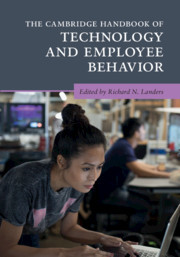Description
The Cambridge Handbook of Technology and Employee Behavior
Cambridge Handbooks in Psychology Series
Coordinator: Landers Richard N.
An exploration of how to keep industrial-organizational psychology from becoming obsolete in the face of accelerating technological change.
Language: English
Subject for The Cambridge Handbook of Technology and Employee Behavior:
The Cambridge Handbook of Technology and Employee Behavior
Publication date: 02-2019
1000 p. · 17.5x25.2 cm · Paperback
Publication date: 02-2019
1000 p. · 17.5x25.2 cm · Paperback
The Cambridge Handbook of Technology and Employee Behavior
Publication date: 02-2019
1000 p. · 18.2x26 cm · Hardback
Publication date: 02-2019
1000 p. · 18.2x26 cm · Hardback
Description
/li>Contents
/li>Biography
/li>
Experts from across all industrial-organizational (IO) psychology describe how increasingly rapid technological change has affected the field. In each chapter, authors describe how this has altered the meaning of IO research within a particular subdomain and what steps must be taken to avoid IO research from becoming obsolete. This Handbook presents a forward-looking review of IO psychology's understanding of both workplace technology and how technology is used in IO research methods. Using interdisciplinary perspectives to further this understanding and serving as a focal text from which this research will grow, it tackles three main questions facing the field. First, how has technology affected IO psychological theory and practice to date? Second, given the current trends in both research and practice, could IO psychological theories be rendered obsolete? Third, what are the highest priorities for both research and practice to ensure IO psychology remains appropriately engaged with technology moving forward?
Part I. Technology in IO Psychology: 1. The existential threat to IO psychology revealed by rapid technological change; 2. Filling the IO/technology void: technology and training in IO psychology; 3. The reciprocal roles of artificial intelligence and industrial-organizational psychology; Part II. Technology in Staffing: 4. The next wave of internet-based recruitment; 5. Applicant reactions in employee recruitment and selection: the role of technology; 6. Applying adaptive approaches to talent management practices; 7. Playing with a purpose: the role of games and gamification in modern assessment practices; 8. Mobile assessment in personnel testing: theoretical and practical implications; 9. The state of technology-enabled simulations: where are we? Where are we going?; 10. The use of social media in staffing; Part III. Technology in training and development: 11. Gamification of adult learning: gamifying employee training and development; 12. Real career development with virtual mentoring: past, present and future; 13. Professional coaching: the impact of virtual coaching on practice and research; 14. Virtual reality training in organizations; Part IV. Technology in Leadership and Teams: 15. Leading from a distance: advancements in virtual leadership research; 16. Managing distributed work: theorizing an IPO framework; 17. Virtual teams: conceptualization, integrative review, and research recommendations; 18. Social media and teamwork: formation, process, and outcomes; Part V. Technology in Motivation and Performance: 19. Telework: outcomes and facilitators for employees; 20. A review and extension of cyber-deviance literature: why it likely persists; 21. Information communication technology and employee well-being: understanding the 'iParadox Triad' at work; 22. Technology and the aging worker: a review and agenda for future research; 23. The role of technology in the work-family interface; 24. Work in the developing world: technology as a barrier, technology as an enabler; 25. I spy: a research agenda for the study of workplace surveillance and privacy; Part VI. Technology in Statistics and Research Methods: 26. Raising the ante: technological advances in IO psychology; 27. Data science as a new foundation for insightful, reproducible and trustworthy social science; 28. Lost in the crowd: crowdsourcing as a research method; 29. Research in the era of sensing technologies and wearables; 30. Storytelling and sensemaking through data visualization; Part VII. Interdisciplinary Perspectives on Employees and Technology: 31. Microblogging behavior and technology adoption at the workplace; 32. Advantages and unintended consequences of using electronic human resource management (eHRM) processes; 33. Technology and social evaluation: implications for individuals and organizations.
Richard N. Landers is Associate Professor, John P. Campbell Distinguished Professor of Industrial and Organizational Psychology, Department of Psychology, University of Minnesota.
© 2024 LAVOISIER S.A.S.
These books may interest you

Using Industrial-Organizational Psychology for the Greater GoodHelping Those Who Help Others 64.97 €



